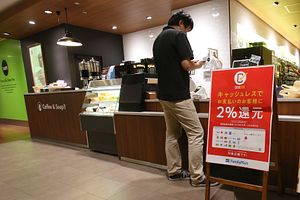On Tuesday, Japan awoke to the transformation of price lists on cafe menus and train tickets. In the lead up to the 10 percent consumption tax increase, there was no escaping the bombardment of notification displays.
The consumption tax last increased from 5 to 8 percent more than five years ago. The latest scheduled increase proposed by the administration or Prime Minister Shinzo Abe — delayed twice due to its unpopularity — has been stressed as the only way to raise funds to improve the country’s ballooning social welfare costs.
While most goods and services were subject to a tax increase, many foods and beverages were excluded and remain at 8 percent. But with the increases in utility bills and daily necessities there will be little disposal income to use elsewhere. The consumption tax is estimated to cost households 5.7 trillion yen ($52.8 billion).
With social security services buckling under the influx of the country’s rapidly aging population, the new revenue generated from the hike will be used to provide free childcare and early education to children under six as a way to encourage women to return to the workforce. It is also expected to alleviate long child care waiting lists holding back women who are eager to return to work.
Over the weekend, supermarkets were crowded with shoppers trying to make last minute savings at the 8 percent tax rate. Purchases of toilet paper, diapers, detergents, and shampoos in bulk increased more than two and a half times compared with the same period last year. Costly electric bicycles saw a rush in demand up 60 percent compared to last year’s data. Meanwhile, as the year comes to an end, crates of alcohol were purchased in bulk with sales growing 10 percent. Hiroshima electric railway, normally closed over weekends, opened an additional sales counter to cater to the rush of commuters buying discounted bulk commuter passes.
In an effort to prevent a possible spending slump, a new cash back reward system was introduced on the condition that electronic payments are used instead of cash. In Japan, cash is king and the new incentive aims to develop public and private sector electronic payment infrastructure. Some participating restaurants or retail stores will offer as much as 5 percent worth of points based on the purchase that shoppers can redeem in the future. The incentive is expected to run until June 2020.
However, the new point rewards intended to offset the tax increase has ironically caused more confusion. Over the weekend, as small and large businesses concentrated on calculating tax increases across all transactions from ATM fees, tobacco, and highway tolls, the point-reward system caused a chaotic start with staff having to explain to customers how the scheme works without fully understanding it themselves. As a result, only 500,000 stores were able to implement to scheme out of the 2 million stores eligible to offer the program.
With cashless technology still relatively unknown in Japan, small and medium sized businesses have criticized the new point-reward system on just how much they ought to push the cashless payment system.
The government is on high alert for any possible setbacks based on past trauma. In 1997, when the consumption tax increased from 3 to 5 percent, Japan unexpectedly suffered a brief recession. Once again, when the consumption tax was raised from 5 to 8 percent in 2014, the economy was said to be heading out of deflation, which was stalled by the consumption tax hike.
Despite the Japanese economy going strong over the past few months, the future looks unpredictable due to a trade war between China and the United States pushing down Japanese business confidence. Overseas demand for electronic equipment, in particular automobile parts, has slowed, but it’s believed the economic impact will be small in part due to the Tokyo Olympic Games set for year.
Abe has stressed that the government will closely monitor for signs of negative economic impacts and is ready to respond quickly with additional measures without waiting for the release of economic statistics.

































